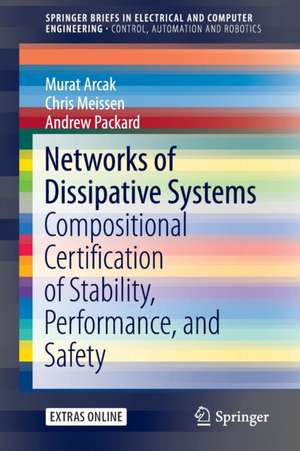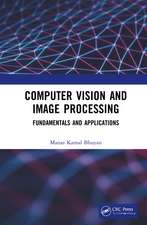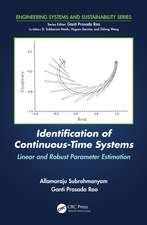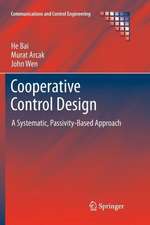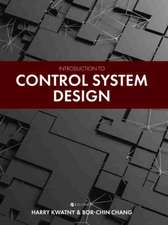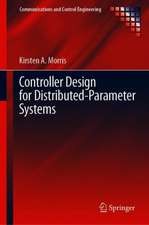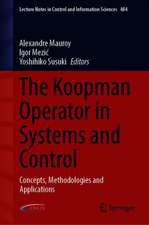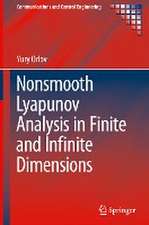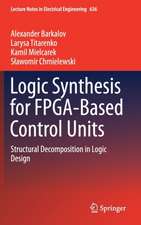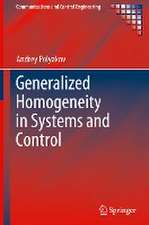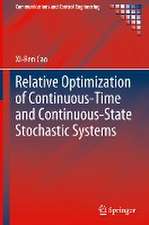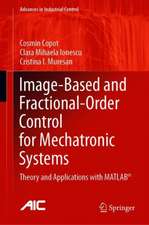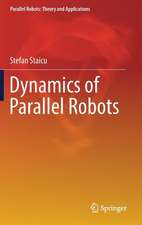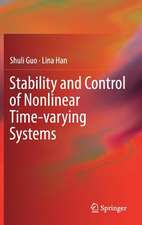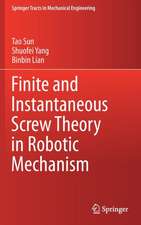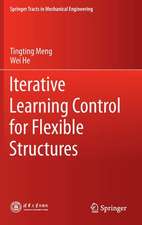Networks of Dissipative Systems: Compositional Certification of Stability, Performance, and Safety: SpringerBriefs in Electrical and Computer Engineering
Autor Murat Arcak, Chris Meissen, Andrew Packarden Limba Engleză Paperback – 10 mar 2016
Din seria SpringerBriefs in Electrical and Computer Engineering
- 19%
 Preț: 427.19 lei
Preț: 427.19 lei -
 Preț: 377.35 lei
Preț: 377.35 lei -
 Preț: 380.07 lei
Preț: 380.07 lei -
 Preț: 378.12 lei
Preț: 378.12 lei - 20%
 Preț: 379.08 lei
Preț: 379.08 lei -
 Preț: 377.18 lei
Preț: 377.18 lei - 20%
 Preț: 234.68 lei
Preț: 234.68 lei - 20%
 Preț: 232.43 lei
Preț: 232.43 lei -
 Preț: 378.12 lei
Preț: 378.12 lei -
 Preț: 377.18 lei
Preț: 377.18 lei - 20%
 Preț: 231.41 lei
Preț: 231.41 lei -
 Preț: 377.18 lei
Preț: 377.18 lei -
 Preț: 377.95 lei
Preț: 377.95 lei -
 Preț: 444.74 lei
Preț: 444.74 lei -
 Preț: 382.36 lei
Preț: 382.36 lei -
 Preț: 378.12 lei
Preț: 378.12 lei -
 Preț: 378.92 lei
Preț: 378.92 lei - 20%
 Preț: 232.43 lei
Preț: 232.43 lei -
 Preț: 376.80 lei
Preț: 376.80 lei -
 Preț: 377.35 lei
Preț: 377.35 lei -
 Preț: 377.18 lei
Preț: 377.18 lei -
 Preț: 381.00 lei
Preț: 381.00 lei -
 Preț: 376.43 lei
Preț: 376.43 lei -
 Preț: 377.18 lei
Preț: 377.18 lei -
 Preț: 378.54 lei
Preț: 378.54 lei - 20%
 Preț: 321.20 lei
Preț: 321.20 lei -
 Preț: 377.73 lei
Preț: 377.73 lei -
 Preț: 341.75 lei
Preț: 341.75 lei -
 Preț: 344.25 lei
Preț: 344.25 lei -
 Preț: 379.09 lei
Preț: 379.09 lei - 20%
 Preț: 324.64 lei
Preț: 324.64 lei -
 Preț: 377.57 lei
Preț: 377.57 lei -
 Preț: 378.71 lei
Preț: 378.71 lei - 20%
 Preț: 321.66 lei
Preț: 321.66 lei - 20%
 Preț: 230.85 lei
Preț: 230.85 lei -
 Preț: 374.30 lei
Preț: 374.30 lei -
 Preț: 375.45 lei
Preț: 375.45 lei -
 Preț: 360.05 lei
Preț: 360.05 lei -
 Preț: 381.43 lei
Preț: 381.43 lei -
 Preț: 378.34 lei
Preț: 378.34 lei -
 Preț: 376.22 lei
Preț: 376.22 lei - 20%
 Preț: 323.99 lei
Preț: 323.99 lei -
 Preț: 380.07 lei
Preț: 380.07 lei -
 Preț: 375.62 lei
Preț: 375.62 lei - 20%
 Preț: 321.20 lei
Preț: 321.20 lei -
 Preț: 377.18 lei
Preț: 377.18 lei - 5%
 Preț: 361.80 lei
Preț: 361.80 lei -
 Preț: 378.12 lei
Preț: 378.12 lei -
 Preț: 375.07 lei
Preț: 375.07 lei -
 Preț: 376.22 lei
Preț: 376.22 lei
Preț: 377.73 lei
Nou
Puncte Express: 567
Preț estimativ în valută:
72.28€ • 75.67$ • 59.81£
72.28€ • 75.67$ • 59.81£
Carte tipărită la comandă
Livrare economică 07-21 aprilie
Preluare comenzi: 021 569.72.76
Specificații
ISBN-13: 9783319299273
ISBN-10: 3319299271
Pagini: 102
Ilustrații: X, 102 p. 19 illus., 6 illus. in color. With online files/update.
Dimensiuni: 155 x 235 mm
Greutate: 0.17 kg
Ediția:1st ed. 2016
Editura: Springer International Publishing
Colecția Springer
Seriile SpringerBriefs in Electrical and Computer Engineering, SpringerBriefs in Control, Automation and Robotics
Locul publicării:Cham, Switzerland
ISBN-10: 3319299271
Pagini: 102
Ilustrații: X, 102 p. 19 illus., 6 illus. in color. With online files/update.
Dimensiuni: 155 x 235 mm
Greutate: 0.17 kg
Ediția:1st ed. 2016
Editura: Springer International Publishing
Colecția Springer
Seriile SpringerBriefs in Electrical and Computer Engineering, SpringerBriefs in Control, Automation and Robotics
Locul publicării:Cham, Switzerland
Cuprins
Brief Review of Dissipativity Theory.- Stability of Interconnected Systems.- Equilibrium Independent Stability Certification.- Case Studies.- From Stability to Performance and Safety.- Appendix: Sum of Squares Programming.
Notă biografică
Murat Arcak is a professor at U.C. Berkeley in the Electrical Engineering and Computer Sciences Department. His research is in dynamical systems and control theory with applications to synthetic biology, multi-agent systems, and transportation. He received the Donald P. Eckman Award from the American Automatic Control Council in 2006, the Control and Systems Theory Prize from the Society for Industrial and Applied Mathematics (SIAM) in 2007, and the Antonio Ruberti Young Researcher Prize from the IEEE Control Systems Society in 2014. He is a member of SIAM and a fellow of IEEE.
Chris Meissen is a Ph.D. candidate in Mechanical Engineering at U.C. Berkeley, under the supervision of Dr. Andrew Packard and Dr. Murat Arcak. His research interests include nonlinear dynamical system analysis, robust and nonlinear control theory, and large-scale optimization. Prior to starting the Ph.D. program he worked in automotive industry and software development.
Andrew Packard isa professor at U.C. Berkeley in the Mechanical Engineering Department. His research covers robust control, quantitative nonlinear systems analysis, and optimization. He is an author of the Robust Control toolbox distributed by Mathworks. The Meyer sound X-10 loudspeaker utilizes novel feedback control circuitry developed by his research group. He is a recipient of the campus Distinguished Teaching Award, the 1995 Eckman Award, the 2005 IEEE Control System Technology Award, and a 2007 IEEE Fellow.
Chris Meissen is a Ph.D. candidate in Mechanical Engineering at U.C. Berkeley, under the supervision of Dr. Andrew Packard and Dr. Murat Arcak. His research interests include nonlinear dynamical system analysis, robust and nonlinear control theory, and large-scale optimization. Prior to starting the Ph.D. program he worked in automotive industry and software development.
Andrew Packard isa professor at U.C. Berkeley in the Mechanical Engineering Department. His research covers robust control, quantitative nonlinear systems analysis, and optimization. He is an author of the Robust Control toolbox distributed by Mathworks. The Meyer sound X-10 loudspeaker utilizes novel feedback control circuitry developed by his research group. He is a recipient of the campus Distinguished Teaching Award, the 1995 Eckman Award, the 2005 IEEE Control System Technology Award, and a 2007 IEEE Fellow.
Caracteristici
Proposes a pioneering new approach to certifying stability and performance in large-scale networked systems with a pedagogical and concise summary Demonstrates the applicability of theoretical methods using illustrative case studies Enables readers to learn from and reproduce mathematical examples by providing the necessary code Includes supplementary material: sn.pub/extras
